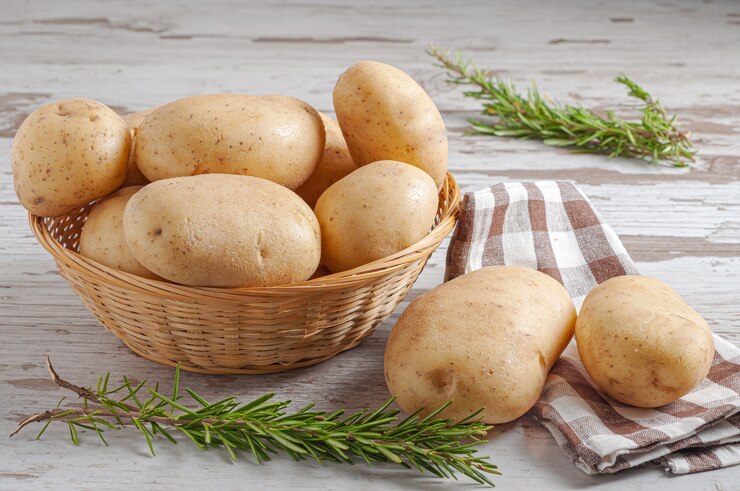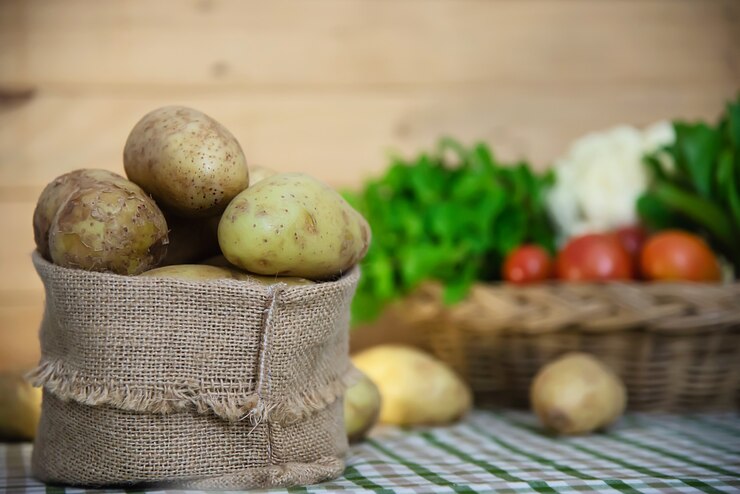Unlocking the Health of Potatoes

Key Takeaways
-
Potatoes are valued in Ayurveda for their grounding properties and ability to balance the body's doshas.
- The nutritional profile of potatoes supports heart health and digestion, making them more than just comfort food.
- Potatoes offer specific Ayurvedic benefits, such as enhancing energy levels and supporting natural bodily processes.
- Incorporating potatoes into your diet can be done healthily by following Ayurvedic principles, with practical recipes and serving suggestions available.
- Embrace potatoes as a versatile and healthful choice in your daily diet, benefiting from their Ayurvedic and nutritional properties.
Potatoes have found their way into kitchens across the globe, but their roots in Ayurveda tell a deeper story. In this ancient practice, potatoes are not just food; they're a source of balance and nourishment. Ayurveda, with its holistic approach, views them as a grounding staple that supports the body's energy and digestion. This article will explore the benefits of potatoes in Ayurveda and how they contribute to wellness. From boosting health to aligning with Ayurvedic principles, potatoes are more than a side dish. Dive into the insights and see why these humble tubers are celebrated in both kitchens and holistic health practices.

What Makes Potatoes Beneficial?
Potatoes are more than just a tasty treat. Let's break down how these humble spuds can boost your health:
-
Rich in Nutrients: Potatoes are packed with essential vitamins and minerals. They offer Vitamin C, which helps your immune system, and potassium, which supports heart health.
-
Good for Digestion: The fiber in potatoes promotes healthy digestion. It helps keep things moving smoothly in your digestive tract.
-
Energy Boosters: Potatoes are a great source of carbohydrates. They provide a quick and lasting energy boost, making them perfect for active days.
-
Versatile in Cooking: You can bake, boil, or mash them. This versatility means you can enjoy potatoes in many healthy ways without getting bored.
-
Low in Calories: When prepared with healthy methods, potatoes can be a low-calorie option that fits into many diets.
Think of potatoes as a staple that fits into various cuisines and dietary needs. They can be a key player in a balanced diet, offering both flavor and nutrition.

Are There Ayurvedic Vegetable Benefits?
Potatoes, often seen as a staple in many diets, offer more than just filling meals. In Ayurveda, they're recognized for their grounding properties. This ancient practice values potatoes for their ability to balance the Vata dosha, which is linked to air and space elements in the body. By stabilizing Vata, potatoes can help reduce anxiety and enhance mental clarity.
A study published in the Journal of Ayurveda and Integrative Medicine highlights that certain vegetables, including potatoes, are crucial in managing imbalances within the body. The study shows how these vegetables can aid in digestion and provide essential nutrients like potassium, which supports heart health.
These benefits emphasize potatoes' role as more than just a comfort food. They offer a natural way to support the body's equilibrium, making them an excellent choice for those seeking balance through diet. Whether mashed or baked, incorporating potatoes into meals aligns with Ayurvedic principles, promoting overall well-being.
How to Incorporate Potatoes in Your Diet?
Potatoes are a versatile ingredient that can be a delightful part of a balanced diet. They offer several health benefits, making them a popular choice in many cuisines. According to the USDA, potatoes are a good source of vitamins C and B6, potassium, and fiber, which are important for maintaining overall health.
One simple way to include potatoes in your meals is by making a hearty potato salad. This dish can be a great side for grilled meats or a light lunch. You can add ingredients like boiled eggs, celery, and mustard to enhance the flavor. Mixing in some Greek yogurt instead of mayonnaise can also make it a bit healthier.
Baked potatoes are another delicious option. They can be a quick and easy meal, especially when topped with vegetables and a sprinkle of cheese. If you’re feeling adventurous, try adding black beans and salsa for a Mexican twist. Baked potatoes are not only tasty but also packed with nutrients.
Mashed potatoes are a classic comfort food. To make them healthier, consider using olive oil instead of butter. You can also mix in some roasted garlic or herbs for extra flavor. This dish pairs wonderfully with roasted chicken or grilled fish, providing a creamy texture that complements many proteins.
For a crispy treat, try making oven-baked potato wedges. These can be seasoned with herbs like rosemary or thyme. Unlike deep-fried options, these wedges are lower in fat and calories while still offering that satisfying crunch. They can be a great snack or a side dish for burgers.
If you're looking to add potatoes into a more exotic dish, consider potato curry. This dish is popular in many cultures and can be made with various spices and vegetables. By simmering potatoes with tomatoes, peas, and spices like cumin and coriander, you create a flavorful meal that's both filling and nutritious.
Potatoes can truly be a star in your kitchen with these simple ideas. They not only bring a variety of flavors and textures to your meals but also offer significant health benefits.
Potatoes: A Healthful Choice
Let's wrap up our exploration of potatoes, a food that truly stands out in the world of Ayurveda. Potatoes are more than just a staple in many kitchens; they're a versatile ingredient packed with benefits. From being a rich source of vitamins and minerals to their role in Ayurvedic practices, these tubers offer a wide range of health properties.
Ayurveda considers potatoes a beneficial vegetable, often used to balance the body's energies. They provide essential nutrients that support overall health. If you're looking to boost your diet, consider adding potatoes for their health properties. They offer dietary fiber, which aids digestion, and antioxidants that help combat free radicals.
As we've discussed, potatoes are not just about carbs. They are about providing your body with what it needs to thrive. Whether you're planning a hearty meal or a light snack, potatoes can fit the bill. Their ability to satisfy and nourish makes them a favorite choice for many.
We'd love to hear your thoughts on potatoes and their benefits. Feel free to share your experiences or recipes in the comments. If you found this information helpful, spread the word by sharing this article with friends. Dive deeper into the world of Ayurveda and see how these humble tubers can enhance your lifestyle.
FAQ For Potatoes
Why are potatoes a staple in Ayurveda?
Potatoes are valued in Ayurveda for their grounding properties, which help balance the body's doshas—Vata, Pitta, and Kapha. Their ability to provide a stable source of energy and nourishment makes them an integral part of Ayurvedic diets.
What makes potatoes beneficial for health?
Potatoes are rich in essential nutrients like vitamin C, potassium, and fiber. These nutrients contribute to heart health by maintaining healthy blood pressure, support digestion, and boost overall immunity.
Are there specific Ayurvedic benefits of potatoes?
Yes, potatoes are known in Ayurveda for supporting the body's natural detoxification processes and enhancing energy levels. Their cooling properties can also help soothe inflammation and balance excess Pitta.
How can I incorporate potatoes into my diet healthily?
Incorporate potatoes into your meals by baking or boiling them to retain their nutrients. You can enjoy them in soups, stews, or as a side dish. Align with Ayurvedic principles by adding spices like turmeric and cumin for enhanced digestion.
Can potatoes support heart health?
Absolutely. Potatoes are a good source of potassium, which helps regulate blood pressure and reduce the risk of heart disease. Their fiber content also aids in maintaining healthy cholesterol levels.
What is the best way to cook potatoes to retain their benefits?
Boiling or steaming potatoes with their skin on is the best way to preserve their nutrients. Avoid frying, as it can add unhealthy fats and diminish their health benefits.
Why should I consider potatoes a healthful choice?
Potatoes are versatile, nutritious, and can be easily incorporated into various dishes. Their ability to support energy levels, digestion, and overall health makes them an excellent choice for a balanced diet, especially when prepared in alignment with Ayurvedic principles.
Got any more questions?
Ask Ayurvedic doctor a question and get a consultation online on the problem of your concern in a free or paid mode.
More than 2,000 experienced doctors work and wait for your questions on our site and help users to solve their health problems every day.

